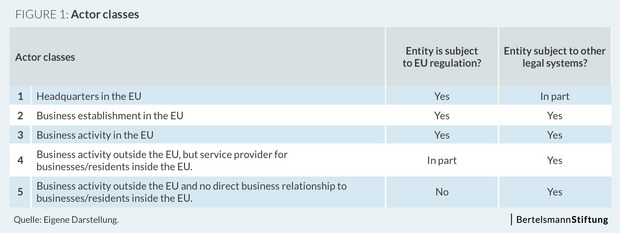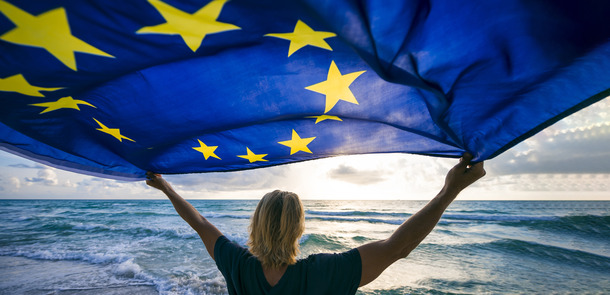"Digital sovereignty" is a declared goal of the German EU Council Presidency. However, for a term that is so central to the current political debate, it is very vague. What exactly can digital sovereignty mean? What are the necessary framework conditions to enable the EU to assert its values and legal concepts in the digital space?
Europe must become technologically and digitally sovereign, said Chancellor Merkel in her speech on the occasion of the German EU Council Presidency. The concept of digital sovereignty is not very clear-cut. In a policy brief, Falk Steiner and Viktoria Grzymek explain the underlying problems and discuss what digital sovereignty can mean in concrete terms: A better awareness and control of dependencies in central elements of the digital infrastructure.
Europe's capacity to act under pressure from digitalization
Partly because the European Union has lacked clear goals in digital policy in recent years, it now finds itself faced with enormous pressure to act. On the one hand, it is concerned with improving digital policy, i.e. the infrastructure such as broadband and mobile networks, and its use. At the same time, digitization is affecting more and more industries and areas in which it is causing massive structural changes in business models and value chains.
The independent regulation of the digital sector is made more difficult by the fact that most digital products and spaces are offered by private companies, which are often not based in the EU. This international dependency is gaining in importance as digital policies play an increasingly important role in the developing confrontation between the US and China. On the one hand, the US has been pushing strategic digital policies to keep markets open and protect intellectual property. On the other hand, China has designed its own digital ecosystem under government control with high research investments and is now massively exporting key technologies to third countries.
Digital policy evidently a European public good
These structural conditions and the insufficient weight of individual Member States make it clear that effective digital policy can only be achieved at the European level. European policy-makers have recognized this and, with the Basic Data Protection Regulation, have provided a first example of how they can set European standards whose influence extends beyond the EU. At the same time, the debate on 5G made it clear that the Member States were divided on crucial issues and were seeking national solutions that stood in the way of an effective European digital policy.
Sovereignty as an ability to shape digitalization
Together with the more strongly perceived pressure to act in recent years, the popularity of the concept of "digital sovereignty" has also increased, although it is rarely clearly defined. What is clear is that in the digital space it cannot be thought of in binary terms between autarchy and dependence. Rather, it is about being able to determine the further development of dependencies and independence oneself.
Digital Sovereignty is the ability of an entity to personally decide the future form of identified dependencies in digitalization and to possess the necessary powers.
This definition includes distinguishing between critical and non-critical areas and incorporating current and future degrees of dependency into the assessment. However, this requires a clear awareness of the actual technological-digital dependencies: How strong is a concrete dependence? Why is the EU specifically dependent (resources, subsidies, technological advantage)?
A common European strategic dependence management
A first step is therefore to record the dependencies in all areas in which digital technologies are used, as the authors demonstrate using the example of 5G. The resulting policy, however, must also be effectively implemented at the European level with a clear mandate. A digitally sovereign policy and the shaping of digitalization that takes into account European values and preserves European basic principles, is only possible together at the European level.
A common European approach offers a great opportunity in this respect. Significant parts of the Western-style democracies (namely most OECD countries) are by no means willing to submit to China's technological and thus also political influence. But there are no alternatives to this dependence. Europe must put itself in a position where other players in digitalization are at least as dependent on its participation in the game as Europe is on theirs. In this case, the EU would indeed be digitally sovereign and would be able to actively enforce its own values and legal concepts against those from third countries operating in the Union, while at the same time having to rediscover its own role as an EU that can be positively experienced by its citizens.






